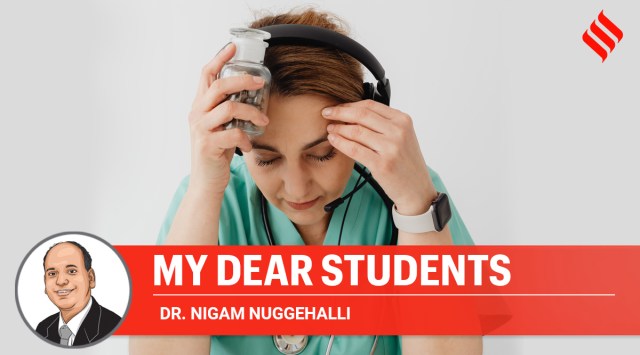Nigam Nuggehalli: What mistakes and fallibility tell us about the nature of the world
"You are entering professions where uncertainties abound, but even in this you have company, because most organised human activities are subject to the same human failings," writes Nuggehalli
 "The level of scientific knowledge available is simply not enough to make the right diagnosis," writes Nuggehalli Nigam. (Graphics by Angshuman Maity)
"The level of scientific knowledge available is simply not enough to make the right diagnosis," writes Nuggehalli Nigam. (Graphics by Angshuman Maity) (My dear students’, a fortnightly column that is a conversation with young minds on current events, books, popular culture — just about anything that’s worth talking over a cup of coffee.)
My dear students,
Today, I want to talk to you about an old publication on the fallibility of doctors. Although the article is focused on physicians, the issues it discusses have ramifications far beyond doctors.
I chanced upon this article when I heard a talk given by Dr Atul Gawande, a Boston-based physician, who has made an attempt to widen the reach of conversations about medicine.
Ironically, he is as interested in why doctors fail as he is in why they succeed. I want to explore this idea a bit more. Why do doctors fail? Gawande asks this question and directs us to a famous article on medical culpability written in the 1970s. This article titled “Toward a theory of medical fallibility” was written by two philosophers, Samuel Gorovitz and Alasdair MacIntyre.
This article, which is freely available on the web, addresses why doctors fail. In the process, he makes some larger points that would be of interest to everyone.
That’s what makes the article fascinating to someone like me who has no technical knowledge of the field. Gorovitz and MacIntyre begin by stating that there are two common reasons why a doctor makes mistakes.
The level of scientific knowledge available is simply not enough to make the right diagnosis. The other possibility is that the doctor wilfully or negligently makes a mistake that goes against scientific knowledge. But, as the authors explain, there is a third way in which mistakes happen.
Even if we know of rules that apply to phenomena, these rules will run out in many circumstances. Some phenomena may always respond to certain rules, like ice cubes, all of which melt at a certain temperature.
But some do not respond in the same way to general rules. like hurricanes. All ice cubes, like Tolstoy’s happy families, are the same. And much like Tolstoy’s unhappy families, no one hurricane is like the other.
Human beings with ailments are more like hurricanes. No single suffering human is like another, medically speaking. So, here we come to a third source of human mistakes.
General rules of medical science that we know about will characteristically apply but not to all the cases that they are supposed to apply to. And such cases are not insignificant in number.
This means doctors are destined to fail in some instances. So, we can fail because we are ignorant, or because we are careless (or malignant), and now, the authors tell us we can fail because it is inevitable.
The authors intended to make this point about doctors but notice how revolutionary this idea is, because responsibility is one of the great issues of our time. Everyone talks about the accountability of human beings but the underlying philosophy of accountability remains elusive.
If many of the phenomena around us (social, economic, physical, biological) are not capable of being subject to general rules at all, then many of us are destined to fail in our engagements with these phenomena, because we just don’t have the wherewithal to understand the world around us.
The authors discourse on human mistakes has implications for the way we think about the law as well.
I hope law students think about why, in many cases, the application of the law, particular statutory law, appears absurd. ‘The law is an ass’, one is tempted to say here.
Perhaps there is a reason why we would like many of our issues to be decided on a case-to-case basis by judges rather than by the legislature.
Our situations are complicated and no one legal situation is like the other. It is inevitable that the law would run out and we will need the judicial mind to go to work.
You might be wondering why I am telling you all this. Well, I suppose sometimes it’s in the particulars that one can seek answers to the bigger questions. If you want to know more about life as a professional, it’s important that you understand the human condition better.
It’s not just that we don’t know enough about our work or that we are prone to mistakes but that even when we have something that we can think of as knowledge, it can fail to apply in particular circumstances. You are entering professions where uncertainties abound, but even in this you have company, because most organised human activities are subject to the same human failings. Our fallibility need not dishearten us though, for our limitations can bring with it some humility in our self-assessments and this can do only do us some good.
- 01
- 02
- 03
- 04
- 05































